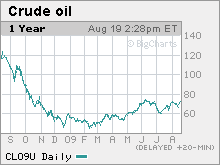Oil eases on jobless claims
Crude futures end up, but fall from 7-week high after an unexpected rise in initial filings for unemployment insurance.
NEW YORK (Reuters) -- Oil prices ended slightly higher but eased off a seven-week high Thursday, as an unexpected rise in new jobless claims cast a shadow over a recovery in the economy and oil demand.
U.S. crude for September delivery, which expires on Thursday's close, settled up 12 cents at $72.54 a barrel.
Oil markets have been watching broader economic indicators for signs a recession may soon end, which could foreshadow a rebound in slumping fuel demand.
The number of workers filing new claims for jobless benefits last week unexpectedly rose to 576,000 from 561,000 the week before.
The index of leading economic indicators rose for a fourth month in July, signaling that a recession is abating. The index rose a less-than-expected 0.6%, versus analyst forecasts for a 0.7% rise.
"It looks like the oil rally has stalled and we're consolidating in the $72 a barrel range," said Gene McGillian, analyst at Tradition Energy in Stamford, Conn.
Crude prices have risen from lows below $33 a barrel in December amid hopes for an economic rebound.
Crude has been tracking gains in U.S. stocks. The S&P 500 index (SPX) rose 0.5% to 1281.09. The dollar was down 0.08% against a basket of foreign currencies.
Earlier, oil prices jumped to a seven-week high of $72.88, supported by a 4.5% surge in Chinese stocks, with investors drawn to attractive valuations after a 20% plunge in Chinese shares over the previous two weeks.
Oil prices steadied after jumping 4.7% Wednesday, when data from the Energy Information Administration showed an unexpected steep drop in crude stocks last week.
Oil markets were also starting to focus on the Organization of the Petroleum Exporting Countries' Sept. 9 meeting, where the producer group was expected to leave output targets unchanged, according to delegates and analysts.
OPEC last year agreed to a series of output cuts to help stem the sharp decline in oil prices.
In addition, traders focused on more efforts by financial regulators in the U.S. and Europe to stem violent oil price swings.
The United States Commodity Futures Trading Commission and the United Kingdom's Financial Services Authority said they have agreed on steps to strengthen cross border supervision of energy futures markets.
The measures could prompt more reporting on the aggregate positions held by crude oil traders on both U.S. and British exchanges, analysts said. ![]()



